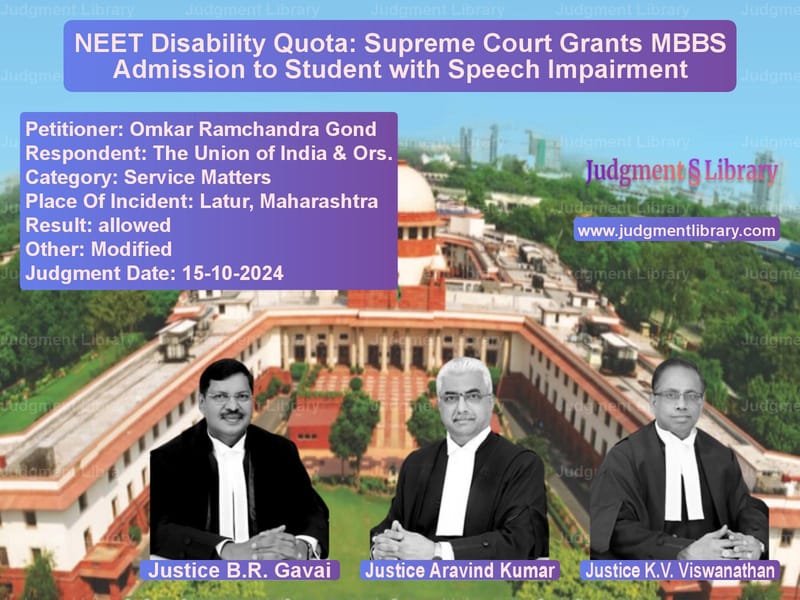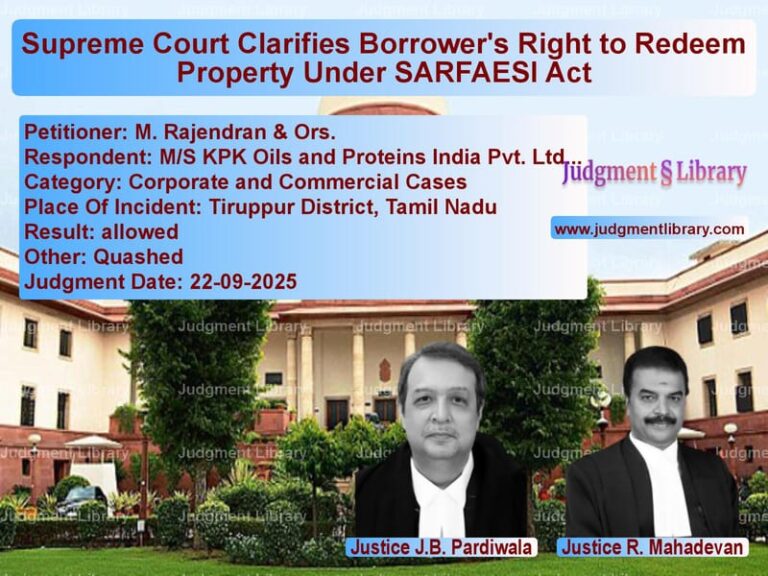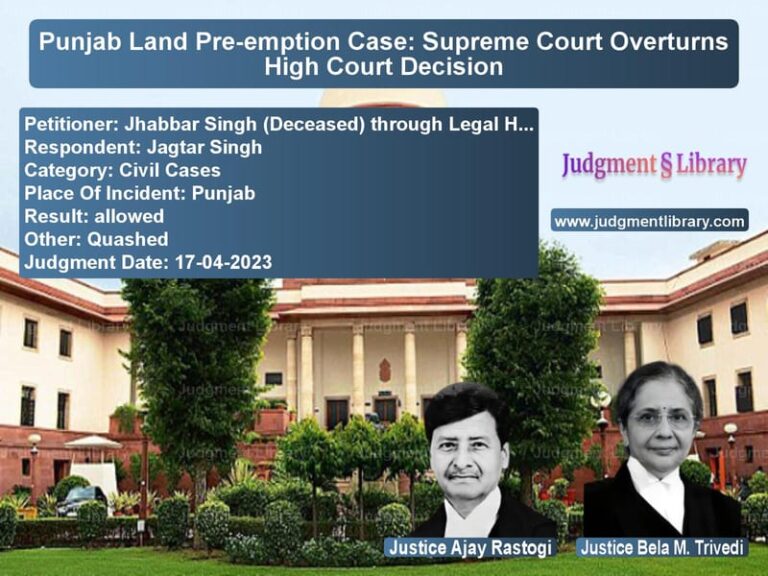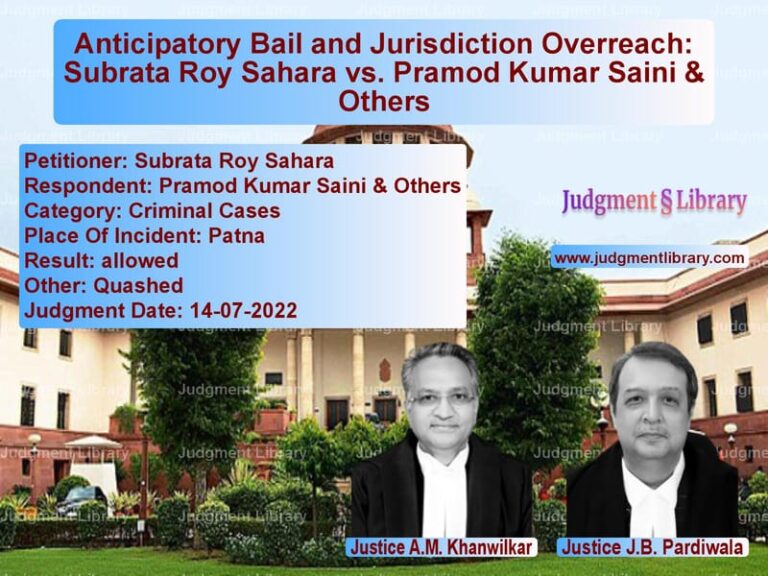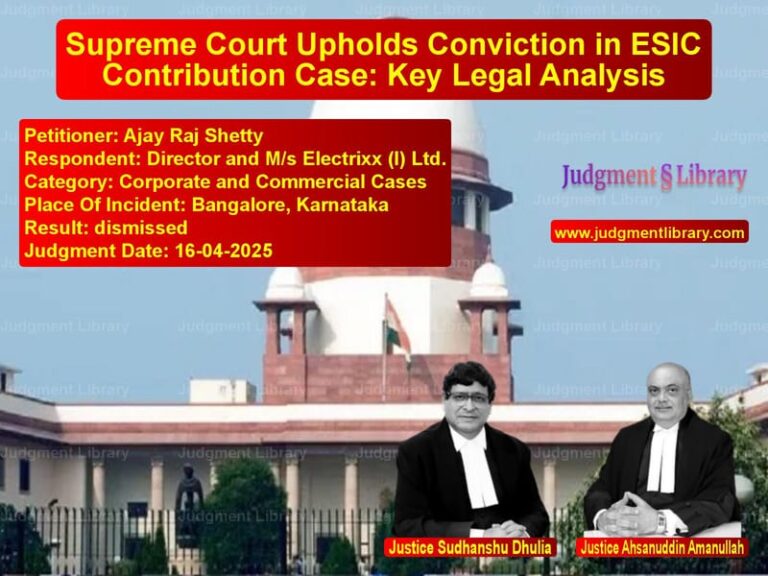NEET Disability Quota: Supreme Court Grants MBBS Admission to Student with Speech Impairment
The case of Omkar Ramchandra Gond vs. The Union of India & Ors. is a landmark judgment that addresses the rights of students with disabilities in medical education. The Supreme Court ruled in favor of the appellant, who was denied admission to an MBBS course under the Persons with Disabilities (PwD) quota due to a speech and language disability exceeding 40%. The Court held that disability alone cannot be a ground for exclusion if the impairment does not affect the candidate’s ability to pursue the medical course.
Background of the Case
Omkar Ramchandra Gond, a student from Latur, Maharashtra, aspired to become a doctor. He was diagnosed with Hypernasality with Misarticulation due to a repaired bilateral cleft palate and was certified with a permanent disability of 44-45%. Despite clearing the National Eligibility cum Entrance Test (NEET-UG) in 2024 and securing a position in the merit list, he was denied admission based on the Medical Council of India (now National Medical Commission, NMC) regulations, which disqualified candidates with speech and language disabilities exceeding 40%.
After his application for the disability quota was rejected, he approached the Bombay High Court, challenging the NMC regulations. However, the High Court did not grant interim relief, forcing him to seek urgent intervention from the Supreme Court.
Petitioner’s Arguments
- The appellant contended that the NMC regulations were discriminatory and violated the Rights of Persons with Disabilities (RPwD) Act, 2016.
- He argued that his speech and language impairment did not hinder his ability to study medicine, as supported by previous case law.
- He highlighted that his disability certificate only quantified his impairment but did not assess whether it would impact his competency in medical education.
- He cited the principle of reasonable accommodation under the RPwD Act, which mandates institutions to provide modifications and support for students with disabilities rather than excluding them outright.
Respondents’ Arguments
- The Union of India and the NMC defended their regulations, stating that medical education requires specific functional abilities, and certain disabilities could hinder professional performance.
- They argued that the 2019 NMC guidelines, which barred candidates with speech and language disabilities exceeding 40%, were based on expert recommendations.
- They maintained that the petitioner could not claim an automatic right to admission under the PwD quota if his disability exceeded the prescribed threshold.
Supreme Court’s Observations
- The Court emphasized that merely exceeding the 40% disability threshold cannot be a reason to reject a candidate without an individualized assessment.
- It held that an over-inclusive classification, which bars all candidates with a certain disability level without considering functional competency, violates Article 14 of the Constitution.
- The judgment referenced previous rulings that support inclusive education, including Vikash Kumar v. UPSC and Bambhaniya Sagar Vasharambhai vs. Union of India, which mandate institutions to provide reasonable accommodations instead of outright rejection.
- The Court noted that the petitioner had been examined by a special medical board at Maulana Azad Medical College, which certified that his speech impairment would not hinder his ability to pursue an MBBS course.
- The Court criticized the NMC for failing to implement a case-by-case assessment model as required under the RPwD Act.
Supreme Court’s Ruling
- The Court set aside the Bombay High Court’s decision and ruled that the petitioner must be admitted to the MBBS course.
- It directed that the seat reserved for him, as per the Supreme Court’s interim order, should be treated as a valid admission.
- The judgment ordered the NMC to revise its regulations and ensure that disability assessments are made on an individual basis rather than through blanket disqualifications.
- The ruling clarified that institutions must focus on functional competencies rather than rigid disability percentages.
Legal Implications of the Judgment
This ruling has significant consequences for medical education and disability rights:
- End of Blanket Disqualifications: The NMC must now assess candidates on a case-by-case basis, ensuring that students with disabilities are not arbitrarily excluded.
- Recognition of Reasonable Accommodation: The judgment reinforces that institutions must take proactive measures to support students with disabilities.
- Strengthening of RPwD Act Provisions: The ruling aligns medical education policies with the broader goal of inclusion under the RPwD Act.
- Judicial Oversight on Professional Course Admissions: The decision sets a precedent for reviewing discriminatory regulations in other fields like law, engineering, and public services.
Conclusion
The Supreme Court’s ruling in this case is a major victory for students with disabilities, ensuring that medical education remains inclusive and fair. By striking down the rigid application of disability thresholds, the Court has reaffirmed the principles of equality and non-discrimination in professional education. The judgment not only secures the petitioner’s admission but also paves the way for future reforms in disability-inclusive policies.
Petitioner Name: Omkar Ramchandra Gond.Respondent Name: The Union of India & Ors..Judgment By: Justice B.R. Gavai, Justice Aravind Kumar, Justice K.V. Viswanathan.Place Of Incident: Latur, Maharashtra.Judgment Date: 15-10-2024.
Don’t miss out on the full details! Download the complete judgment in PDF format below and gain valuable insights instantly!
Download Judgment: omkar-ramchandra-gon-vs-the-union-of-india-&-supreme-court-of-india-judgment-dated-15-10-2024.pdf
Directly Download Judgment: Directly download this Judgment
See all petitions in Education Related Cases
See all petitions in Fundamental Rights
See all petitions in Constitution Interpretation
See all petitions in Public Interest Litigation
See all petitions in Judgment by B R Gavai
See all petitions in Judgment by Aravind Kumar
See all petitions in Judgment by K.V. Viswanathan
See all petitions in allowed
See all petitions in Modified
See all petitions in supreme court of India judgments October 2024
See all petitions in 2024 judgments
See all posts in Service Matters Category
See all allowed petitions in Service Matters Category
See all Dismissed petitions in Service Matters Category
See all partially allowed petitions in Service Matters Category

